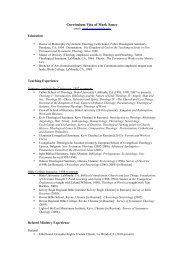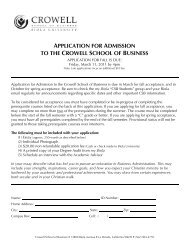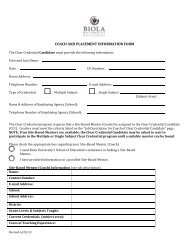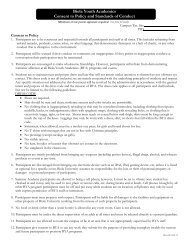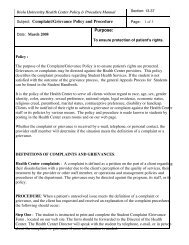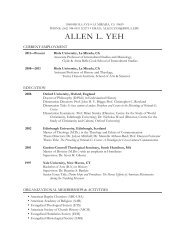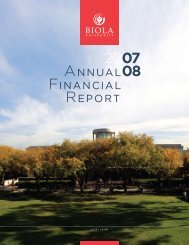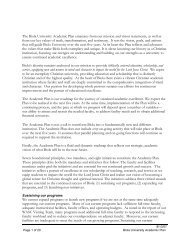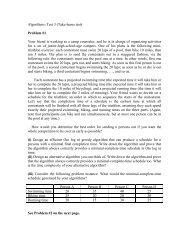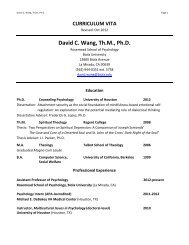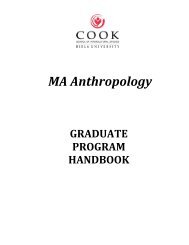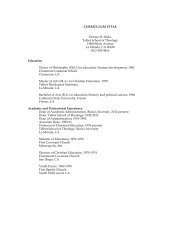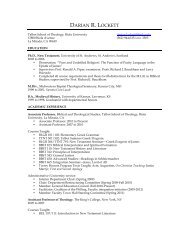Create successful ePaper yourself
Turn your PDF publications into a flip-book with our unique Google optimized e-Paper software.
ing faculty study and are numbered from 811 through 865. Recently<br />
an emphasis in Non-profit Leadership and Administration has been<br />
implemented and these elective courses are grouped together following<br />
the General Emphasis listing.<br />
In selecting a program of study, students may incorporate any electives<br />
offered (consult the two-year projected schedule of courses). In<br />
addition, sufficient latitude in designing elective course assignments<br />
permits students to pursue a variety of research interests. Courses are<br />
usually offered on a rotating basis every two or three years.<br />
e d. d. I n e d U C at I o n a l s t U d I e s (3 6 U n I t s)<br />
Core Studies (15 units)<br />
All students complete 15 semester units of required coursework.<br />
Students should pursue the completion of core courses early in their<br />
program.<br />
Foundational Core (6 units)<br />
de 801 Philosophical issues in educational studies ........... 3<br />
de 806 Theological integration for educational studies .. 3<br />
Research Core (6 units)<br />
ttde 8<strong>07</strong> educational research methods ................................... 3<br />
ttde 860 Qualitative research<br />
or ttde 808 statistical methods in educational research ......... 3<br />
Internship (3 units)<br />
ttde 884 Doctoral internship ........................................................1–3<br />
Electives Program (21 units)<br />
In consultation with the program advisor, the student designs<br />
a program (21-semester-unit minimum) in light of educational<br />
background and vocational and research interests. Elective courses<br />
offered by doctoral faculty pertain to areas of expertise and continuing<br />
faculty study and are numbered from 811 through 865.<br />
In selecting a program of study, students may incorporate any electives<br />
offered (consult the two-year projected schedule of courses). In<br />
addition, sufficient latitude in designing elective course assignments<br />
permits students to pursue a variety of research interests. Courses are<br />
usually offered on a rotating basis every two or three years.<br />
Courses (TTDE)<br />
Normally, doctoral courses are available as term-length courses in the<br />
fall and spring and as one- or two-week intensive modules during<br />
January and the summer session. Recent visiting faculty who have<br />
offered Selected Topics seminars include: Robert Pazmiño, Warren<br />
Benson, Linda Cannell, Kenneth Gangel, Ted Ward.<br />
ttde 801 Philosophical issues in educational studies ..................3<br />
An advanced course in which students examine philosophi-<br />
cal issues relevant to educational studies from a Christian<br />
worldview perspective. Emphasis is placed on enhancing<br />
critical thinking about educational issues primarily through<br />
the preparation of several critical book reviews suitable for<br />
publication.<br />
ttde 803 human Development and Learning ................................3<br />
Advanced study of the processes of learning and life-span<br />
human development. Investigation centers on understanding<br />
of social science data within a Christian worldview. Students<br />
are challenged to develop implications for various teaching<br />
contexts.<br />
ttde 804 management & organizational Behavior<br />
in non-profit organizations ................................................3<br />
Advanced study of significant theories and principles of<br />
effective administration as applied in selected non-profit<br />
organizations. Emphasis is upon the integration of manage-<br />
ment theory and biblical concepts for use within local and<br />
international educational and other non-profit institutions.<br />
(Core course: Non-profit Leadership emphasis)<br />
ttde 8<strong>05</strong> Teaching & Curriculum Theory ...........................................3<br />
Advanced study of teaching within various educational set-<br />
tings. Students are challenged to enhance their personal rep-<br />
ertoire of teaching skills and educational strategies through<br />
observation, discussion and practice. Includes an investigation<br />
of guidelines for curriculum design.<br />
ttde 806 Theological integration for educational studies .........3<br />
An introduction to research method and relevant resources in<br />
biblical and theological studies to inform scholarly research of<br />
educational studies and ministry practice. Students prepare<br />
an integrative paper based on biblical and theological studies<br />
and social science findings.<br />
ttde 8<strong>07</strong> educational research methods .........................................3<br />
Advanced study of a variety of methods for scholarly educa-<br />
tional research. The course focuses on research evaluation and<br />
the literature review portion of a study, addressing research<br />
design, data collection methodology and results analysis.<br />
ttde 808 statistical methods in educational research ................3<br />
A practical, computer-based study of the concepts and<br />
techniques involved in the analysis and interpretation of<br />
quantitative research data based on descriptive and inferential<br />
statistics. Topics include describing data, correlation, regres-<br />
sion, multiple regression, introduction to factor analysis, and<br />
analysis of variance.<br />
ttde 811 introduction to Christian spirituality ...............................3<br />
This course explores the means to developing a deep<br />
relationship with God. Based on scriptural teaching about<br />
knowing God, it is geared particularly for those preparing for<br />
or engaged in Christian ministry. Topics include barriers that<br />
hinder us and what spiritual disciplines and practices may be<br />
used to nurture a deeper friendship with God.<br />
218 Talbot School of Theology B I O L A U N I V E R S I T Y



